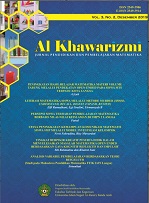LITERASI MATEMATIKA SISWA MELALUI METODE MURDER (MOOD, UNDERSTAND, RECALL, DIGEST, EXPAND, REVIEW)
DOI:
https://doi.org/10.22373/jppm.v3i2.7350Keywords:
mathematical literacy, MURDER method, PISA assessment frameworkAbstract
This paper aims to describe the mathematical literacy skills of students of SMAN 1 Takengon after being given learning using the MURDER method (Mood, Understand, Recall, Digest, Expand, Review). Mathematical literacy skills are seen according to the assessment framework according to PISA, namely 1) Communicating, 2) Mathematising, 3) Representation, 4) Reasoning and Argument, 5) Devising Strategies for Solving Problems, 6) Using Symbolic, Formal and Technical Language and Operation and 7) Using Mathematics Tools. This research is quantitative research involving 70 students of class XII of SMAN 1 Takengon. Based on the results of the analysis and processing of data obtained, namely th = 1.71 and t (1-α), = 1.67. This shows that the research hypothesis is accepted where students' mathematical literacy skills taught using the MURDER method are better than students' mathematical literacy skills taught with conventional learning models. The mathematical literacy skills of students in the experimental class are high with the number of students 20 people with a percentage of 57.14%. While the mathematics literacy skills of the control class students are classified as moderate with the number of students 17 people with a percentage of 48.57%. In the experimental class, there were 8 students or 22.86% in the very high category, superior to the control class, namely 5 students with a percentage of 14.29%.References
Ainiyah, Umi & Marsigit (2018). Literasi Matematika: Bagaimana Jika Ditinjau dari Kemampuan Pemecahan Masalah Matematika Siswa SD Kelas Tinggi?. Jurnal Riset Pendidikan Matematika, 4(1), 5-14.
Centre for Education Statistics and Evaluation (2016). How Schools Can Improve Literacy and Numeracy Performance and Why It (Still) Matters.
Hayes, J. R. (1981). The Complete Problem Solver. Philadelphia: The Franklin Institute Press.
K. Darmika, K. Suma, I. W. S. (2014). Pengaruh Model Pembelajaran Kooperatif MURDER Terhadap Motivasi Belajar Dan Prestasi Belajar IPA Siswa SMP. E-Journal Program Pascasarjana Universitas Pendidikan Ganesha, 4(2), 98.
Majid, A. (2014). Pembelajaran Tematik Terpadu. Bandung: Remaja Rosdakarya.
Mustaqim, B., dkk. (2013). Eksperimentasi Model Pembelajaran Kooperatif Tipe Think Pair Share (TPS) dan Mood Unsderstand Recall Detect Elaborate Review (MURDER) Pada Materi Pokok Logaritma Ditinjau dari Minat Belajar Siswa Kelas X SMK Se Kabupaten Karanganyar. Jurnal Pembelajaran Matematika, 1 (3), 287-296.
OECD (2013). PISA 2012 Assessment and Analytical Framework: Mathematics, Reading, Science, Problem Solving and Financial Literacy. OECD Publishing.
Ojose, B. (2011). Mathematics for Literacy: Are We Able to put The Mathematics We Learn Into Everyday Use?. Journal of Mathematics Education, 4 (1), 89-100.
Pacific Policy Research Center (2010). 21st Century Skills for Students and Teacher: Research and Evaluation. Kamehameha Schools Research & Evaluations Division.
Santyasa, I. W. (2004). Pengaruh Model dan Setting Pembelajaran terhadap Remidiasi Miskonsepsi, Pemahaman Konsep dan Hasil Belajar Siswa pada Siswa SMU. Disertasi, tidak diterbitkan. Universitas Negeri Malang.
Sardiman (2011). Interaksi dan Motivasi Belajar Mengajar. Jakarta: Raja Grasindo Persada.
Sari, S. A. (2014). Implementasi Model MURDER dalam Pembelajaran matematika Untuk Meningkatkan Kemampuan Berfikir Kritis dan Kreatif (PTK pada Siswa Kelas X Akuntansi Pemasaran di SMK Muhammadiyah Delanggu Tahun Ajaran 2013/2014). Skripsi, tidak dipublikasikan. Universitas Muhammadiyah Surakarta.
Sudjana (2005). Metode Statistika. Bandung: Tarsito
Susanto, A. (2013). Teori Belajar dan Pembelajaran di Sekolah Dasar. Jakarta: Kencana Prenadamedia Group
Yusuf, R., Hayati, E., & Fajri, I. (2019, October). Meningkatkan Literasi Digital Siswa Sekolah Menengah Atas Melalui Model Project Citizen. In Prosiding Seminar Nasional “Reaktualisasi Konsep Kewarganegaraan Indonesia” (Vol. 1, pp. 185-200). Fakultas Ilmu Sosial Universitas Negeri Medan.
Zainiyah, U. (2018). Literasi Matematika : Bagaimana jika Ditinjau dari Kemampuan Pemecahan Masalah Matematika Siswa SD Kelas Tinggi ? Mathematical Literacy : How if Viewed from Mathematics Problem Solving Ability of High-Grade ’ s Elementary School Students ? Jurnal Riset Pendidikan Matematika, 4(1), 5–14.

